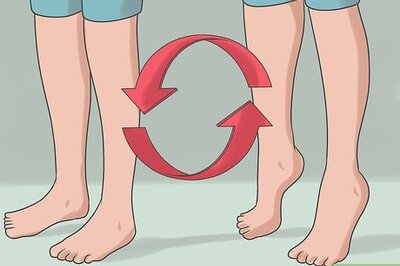
views
The thyroid is a small but important gland placed at the base of the neck. The gland releases hormones to maintain several functions in the body such as growth, cell repair and metabolism. However, certain conditions can cause the gland function improperly. When the thyroid gland does not make enough thyroid hormones then the condition is known as hypothyroidism. People with hypothyroidism may often feel cold and fatigued and may gain weight easily. According to a paper published in The Lancet Journal, the prevalence of hypothyroidism in India is about 11%.
One of the problems associated with hypothyroidism is a slower metabolism, so research suggests that boosting the metabolism with lifestyle changes could help in regulating hypothyroidism. Along with regular exercises and physical activity, it is also important to eat foods that aid your metabolism. Similarly, you should also avoid the food items or nutrients that can worsen the condition. Here is a list of a few food items that you may want to avoid if you have hypothyroidism:
1. Gluten
Gluten, a protein found in foods processed from wheat, barley and millet, can alter the digestive system and irritate the small intestines. This hampers the absorption of thyroid hormones, leading to hypothyroidism. A study also concludes that a gluten-free diet promotes the absorption of thyroid medication. But if you want to have gluten-containing grains, then try having whole grains (whole wheat flour or atta) but not processed or polished grains (white flour or maida). Some of the gluten-free grains are corn, oats, buckwheat, rice, quinoa, finger-millet (ragi) which you might consider in your gluten-free diet.
2. Cabbage family vegetables
Cruciferous vegetables like broccoli and cabbage are known to be packed with nutrition and fiber-rich but they contain a compound known as goitrogens, which can affect thyroid function. Some research suggests that cruciferous vegetables interfere with iodine absorption and decrease thyroid hormone production and should not be consumed raw. On the other hand, researchers also argue that to alter the thyroid function one has to eat a lot of cruciferous vegetables. If you do include these vegetables in your diet, do so in small amounts and ensure that they are cooked well, as that inactivates the goitrogens present in these vegetables.
3. Soy and soy-derived food products
Soy, tofu and soy milk are rich in isoflavones, a compound that is believed to increase the risk of hypothyroidism and make it harder to absorb the thyroid hormone. However, since research is still divided over whether an increased intake of soy products would worsen the conditions, it is best to avoid overindulging in these foods.
4. Caffeine
For some people, coffee might be their favourite morning ritual. But a study published in the journal Thyroid suggests that caffeine present in coffee can block the absorption of thyroid hormones in the digestive system. Also, patients of hypothyroidism are advised to take the thyroid supplement first thing in the morning. If you must have it, doctors strongly suggest waiting for at least 30-45 minutes after taking the supplement to have your cup of coffee ? or any food or beverage for that matter.
5. Junk or processed foods and desserts
Who does not enjoy an evening snack of pakodas, pastries or sweets? Unfortunately, these delicacies aren’t a good idea for people who have hypothyroidism. The processed foods such as preserved meat, canned desserts, packed chips or fritters have tons of salt, sugar, oil and preservatives in them and should be avoided. These foods are empty calories with zero or little nutrition and put an unnecessary calorie burden on the body. Due to the slower metabolism in hypothyroidism, it makes it harder to burn the excess calories and can lead to obesity.
6. Alcohol
Before you order your favourite cocktail, you should know that alcohol can cause havoc on both thyroid hormone levels in the body and the ability of the thyroid gland to produce the hormone. According to a study published in the Indian Journal of Endocrinology and Metabolism, alcohol can even cause or increase the chances of mood disorders, which are also associated with hypothyroidism. Therefore, it is best to avoid alcohol consumption if you have a thyroid disorder.
For more information, read our article on Hypothyroidism.
Health articles on News18 are written by myUpchar.com, India’s first and biggest resource for verified medical information. At myUpchar, researchers and journalists work with doctors to bring you information on all things health.
Read all the Latest News, Breaking News and Coronavirus News here




















Comments
0 comment